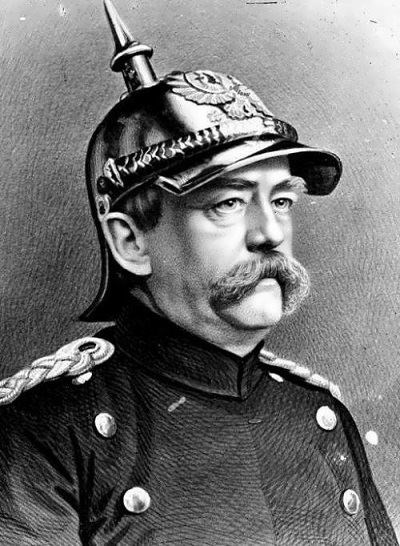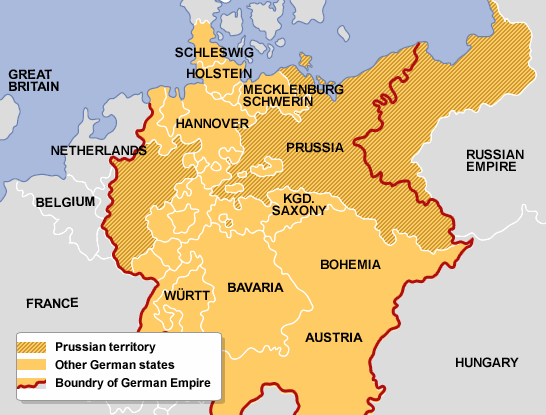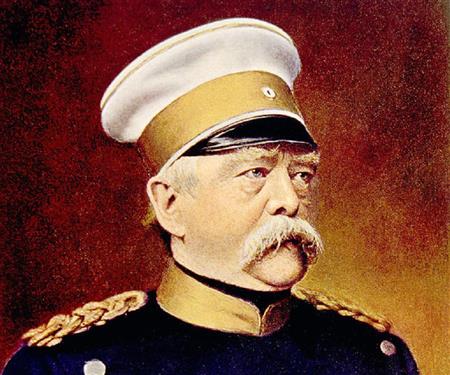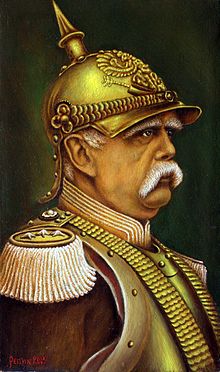 |
| Drawing of Bismarck in his general's uniform (http://mirfaces.com/otto-von-bismarck-iron-chancel ()) |
"The great questions of the day can not be decided by speeches and resolutions of majority votes but by iron and blood."-Otto von Bismarck. This speech by Otto von Bismarck was one of his most famous. When he was in the government, many people were inspired by his words:
Otto von Bismarck was perhaps the most significant European statesman in the second half of the nineteenth century. As minister-president of the north German state of Prussia from 1862, his policies resulted in the creation of a politically unified German national state in central Europe. As Reich chancellor of the new German Empire (or Reich) from 1871, he determined Germany's political course for a further nineteen years until he was forced to resign by Kaiser William II (r. 1888-1918), the new emperor, in 1890. (Lerman, Katharine)
What Bismarck was most known for was the unification of Germany. He made the decisive decision to provoke a war that would make South Germany conform with the new North German Confederation,which in the end worked and the two Germany's became one.(Lerman, Katharine). Bismarck was born on April 01, 1815 in Schonhausen, Germany and died july 30, 1898 in Friedrichsruh, Germany.(Lauren, Katherine).
In 1846 he moved to Schonhausen, where he could exploit the opportunities for political patronage offered by Ludwig von Gerlach, the president of the court of appeals in Magdeburg and brother of the king Frederick William IV's (r. 1840-1861) adjutant-general, Leopold von Gerlach. He also assumed his first public office as a dyke-reeve responsible for overseeing flood defenses on a stretch of the river Elbe. (Lauren, Katharine)
This is what would start his career as a government official. From the time he was in the government to his death bed Bismarck tried his best to make nation he could even though his dreams were out of reach he still managed to grab ahold of them. Otto Eduard Leopold, soon to be known as Otto von Bismarck, formed one of the most powerful nations of the late 1800's. His willingness to make things happen, the support that he gave to whomever needed it, and the inspiring actions he took to make his dream a reality, makes him a remarkable hero.
 |
| Map showing Prussia and surrounding German States (http://www.bbc.co.uk/bitesize/higher/history/natio ()) |
Bismarck's dream of making a powerful nation means he is willing to do whatever it takes to achieve that. Bismarck liked to take risks, in fact he took many risks during his life, some of which became the better for the great German nation. When Bismarck wanted to state something he would, clearly at that. "A constitutional crisis would not be disgraceful, but honorable instead. - Furthermore, we are perhaps too "well-educated" to support a constitution; we are too critical; the ability to assess government measures and records of the public assembly is too common." ("Blood and Iron"). He is willing to take risks because he wants to make a new constitution even though it could become a national crisis. Taking that risk could either destroy what he has created or make it better than before. The German nation will become something that has never been seen before because of this new constitution, something not even the greatest kings and queens of the time would be able to accomplish. When Bismarck was just entering the government system he decided that it would be he that makes Germany better, even to the end of his life he would strive for it's greatness.
Bismarck lived and died for the Prussian social system as it was enshrined in the monarch. He prospered by the monarchy and perished by the monarchy. He unified Germany to preserve Prussia, but thus enabled Prussia to grow and dominate Germany. He stabilized Europe to preserve the Prussianized Germany, but thus enabled Germany to dominate Europe. ("Otto von Bismarck")
He was willing because he lived by what he believed in and died by it, The forming of Germany and it social system. He would stop at nothing to complete the new country and make it one of the greatest nations in Europe as it was his dream to do so. Otto von Bismarck achieved great things. Those around him most prominently knew him as one who was willing to move forward, not stare into the depths of the past.
 |
| Drawing of Bismarck but in a more casual clothing (http://www.thefamouspeople.com/profiles/otto-eduar ()) |
Instead of taking the easy route Bismarck took the more difficult one by supporting the nation and its people. 1862, the year that the great Otto von Bismarck gave his famous Blood and Iron speech. He gave it as a way of showing what he was going to make happen. "Public opinion changes, the press is not public opinion; one knows how the press is written; members of parliament have a higher duty, to lead opinion, to stand above it. We are too hot-blooded, we have a preference for putting on armor that is too big for our small body; and now we're actually supposed to utilize it." ("Blood and Iron"). He is supportive because he wants to try and change for the better of the country, for public opinion. So that means that he wants supports the public as a whole group. The government should lead what the public opinion is so that the public will have fair trial in things to come. The German chancellor wanted to give the farmers and industrialists the money they deserve from the trading they did.
More importantly, Bismarck was dissatisfied with the National Liberals' economic policy. He was learning that the laissez-faire (free trade, free enterprise) economic policy pursued by England was not good for Germany. Free trade was hurting both the new class of industrialists in the West and the traditional Junker agriculturists in Prussia. ... he cared a great deal for his fellow Prussian farmers who were being economically devastated by foreign imports of American grain. ("Otto von Bismarck")
He was supportive because he supported the workers. Germany's economy was worsening and he helped to fix that. He was a fellow farmer, he wanted to help them, he knew what a struggle it could be to make money as a farmer. He wanted to support them because of that. Bismarck was a man of honor and respect, he would go to great lengths to help support his ever growing nation so that it would dominate the European empires.
 |
| Drawing of Bismarck in his general's uniform (http://www.wikiwand.com/ro/Otto_von_Bismarck ()) |
ce Iron Chancellor was and shouldn't have been denied as the person whose dreams woke up the states of North and South Germany to become a whole. His willingness and his supportiveness made him the man you can rely on, what he did also made him an inspiration to those around him, this alone proves that he was a heroic figure of the past. Bismarck was willing because he would do anything for his nation, the significance is that being willing was how he created a nation where people wanted to be. People were amazed by what he was willing to do. He was also supportive of those in dire need of it. That is significant because supporting those around you makes them look up to you and strive to also help you.
Germany is not looking to Prussia's liberalism, but to its power; Bavaria, Württemberg, Baden may indulge liberalism, and for that reason no one will assign them Prussia's role; Prussia has to coalesce and concentrate its power for the opportune moment, which has already been missed several times; Prussia's borders according to the Vienna Treaties [of 1814-15] are not favorable for a healthy, vital state; it is not by speeches and majority resolutions that the great questions of the time are decided - that was the big mistake of 1848 and 1849 - but by iron and blood. ("Blood and Iron")
Otto von Bismarck inspires me because of the powerful and inspiring speeches he gave. Those speeches are what gave the German people hope in hard times and directed them to the right path if strayed. Not only has he inspired other countries governments to try using similar laws and regulations he also inspires me to try and be like him, my great, great, great, etc, grandfather. Even though Bismarck gave many remarkable speeches in his time, he still thought that speeches did not give an answer to the questions that were asked. Just because someone told you something doesn't mean you should believe it, only when they outright show you will it ever mean anything.
Works Cited
LERMAN, KATHARINE. "Otto von Bismarck." Europe 1789-1914: Encyclopedia of the Age of
Industry and Empire, edited by John Merriman and Jay Winter, Charles Scribner's Sons, 2006. Biography in Context, link.galegroup.com/apps/doc/K3446900089/BIC1?u=powa9245&xid=d90090ff.
Accessed 27 Apr. 2017
Otto von Bismarck, "Blood and Iron", ebd.gov, Centre for Comparative and Public History
Department of History Chinese University of Hong Kong In-Service Teacher Training Course The Making of the Modern World,
http://www.edb.gov.hk/attachment/en/curriculum-development/kla/pshe/references-and-resources/history/making_of_modern_world_source10_eng.pdf
Page created on 5/24/2017 12:00:00 AM
Last edited 5/24/2017 12:00:00 AM
